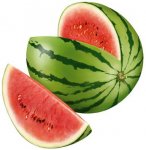What food against cancer?
The WCRF gives us the results of a large study, and a list of simple food practices to follow to reduce the risk of cancer.
The World Cancer Research Fund has not conducted a specific study but instead have produced a compilation of all studies and all published articles about the relationship between diet and cancer.

To reduce the risk, 9 habits to adopt:
- Fibers.
Foods rich in fiber repel the colorectal cancer risk.
Fiber is found in whole foods (bread, rice, pasta). - Garlic.
It has the same effect as the fibers. And as a vasodilator, it is also good for the arteries. - Onion.
It belongs to the same family as garlic and has in general the same effects, but is recommended against cancer of the stomach. - Fruits.
Their vitamins help fight against cancers of the mouth , aesophage, stomach, lungs. - Vegetables without starch.
Against cancer of the mouth, esophagus, stomach.
There are plenty of starch in starchy foods and cereals. Therefore, beans, wheat and similar, rice.
These foods are not to be avoided, but we must also use other vegetables. - Lycopene.
Cons of prostate cancer.
This powerful anti-free radical is in abundance in the tomato, watermelon. - Selenium.
Against prostate cancer.
It is not recommended to absorb food supplements because excess of selenium is harmful and quickly reached. But sufficient quantities may be found in kidneys, fish, shellfish, garlic. - Calcium.
Against cancer of the colorectum.
It is obtained with dairy products, cheese, pure water. - Folic acid. (Vitamin B9).
Against pancreatic cancer.
May be found in vegetable seeds, in liver.
In addition, physical activity, such as jogging five days a week for 40 minutes, also helps to fight cancer. This must be accompanied by a diet rich in vitamins and antioxidants as producer of free radicals.
For women, the practice of breastfeeding helps prevent breast cancer.
Depending on the type of cancer, we recommend the following foods and habits:
- Mouth, pharynx and esophagus: Fruits, vegetables without starch.
- Lungs: Fruits.
- Stomach: Fruits, onions, vegetables without starch.
- Pancreas: Folic Acid (B9).
- Colorectum: Garlic, fiber, calcium, physical activity.
- Prostate: Lycopene, selenium.
- Breast: Breastfeeding and physical activity.
- Uterus: Physical Activity.
Source: WCRF. 7000 compilation of studies from all countries.






